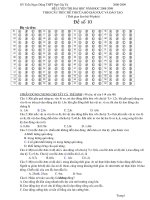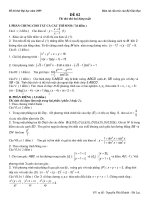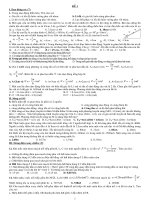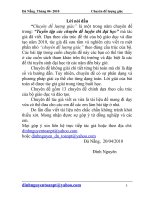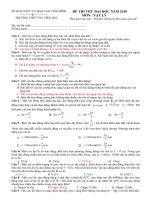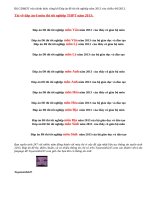(CÓ ĐÁP ÁN) ĐỀ MINH HỌA THEO CẤU TRÚC CỦA BỘ GIÁO DỤC SỐ 04
Bạn đang xem bản rút gọn của tài liệu. Xem và tải ngay bản đầy đủ của tài liệu tại đây (157.58 KB, 8 trang )
ĐỀ MINH HỌA SÓ 04
Mark the letter A, B, C, or D to indicate the word whose underlined part differs from the other three in
pronunciation in each of the following questions.
1.
A. serves
B. hopes
C. likes
D. writes
2.
A. park
B. start
C. card
D. catch
Mark the letter A, B, C, or D to indicate the word that differs from the other three in the position of the
primary stress in each of the following questions.
3.
A. express
B. enter
C. employ
D. reduce
4.
A. purity
B. chemical
C. habitat
D. destruction
Mark the letter A, B, C or D to indicate the correct answer to each of the following questions.
5. He rarely goes fishing, _________?
A. doesn’t he
B. is he
C. does he
D. isn’t he
6. Have you ever considered _________ to study in a foreign country?
A. going
B. to go
C. to be going
D. having gone
7. If people paid more attention to the environment, the Earth _________ greener.
A. would be
B. will be
C. would have been
D. had been
8. In my company, the director deputy usually _______ the responsibility for organizing meetings and
conferences.
A. took
B. take
C. has taken
D. takes
9. I knew they were talking about me _________ they stopped when I entered the room.
A. because
B. so that
C. because of
D. despite
10. A few months ago I moved into a very small flat _________ for years with my parents.
A. after I have lived
B. before I had lived
C. before I was living D. after I had lived
11. It would be to your advantage to prepare questions _________.
A. by chance
B. on the whole
C. in advance
D. for short
12. Many of the pictures _________ from outer space are presently on display in the public library.
A. to send
B. sent
C. sending
D. were be sent
13. I _________ think that we should do something immediately to change the situation we are in.
A. person
B. personal
C. personally
D. personality
14. “Sorry for being late. I was _________ in the traffic for more than an hour.”
A. carried on
B. held up
C. put off
D. taken after
15. I have no idea to _________ this kind of business.
A. make
B. turn
C. take
D. run
16. There’s a(n) _________ of difference between liking someone and loving them.
A. world
B. earth
C. whole
D. entirety
17. His answer was so confusing that it hardly made _________.
A. meaning
B. interpretation
C. indelibility
D. sense
18. The children are really getting in my _________ Tell them to go and play out side.
A. hair
B. nerves
C. mouth
D. books
Mark the letter A, B, C or D to indicate the word(s) CLOSEST in meaning to the underlined word(s) in
each of the following questions.
19. I hope things will start to look up in the new year.
A. get better
B. get worse
C. become popular
D. get bored
20. Drunk driving can lead to some tragic results.
A. miserable
B. peaceful
C. delighted
D. lasting
Mark the letter A, B, C or D to indicate the word(s) OPPOSITE in meaning to the underlined word(s) in
each of the following questions.
21. He was so insubordinate that he lost his job within a week.
A. fresh
B. disobedient
C. obedient
D. understanding
22. If you are at a loose end this weekend, I will show you round the city.
A. free
B. confident
C. occupied
D. Reluctant
Mark the letter A, B, C, or D on your answer sheet to indicate the sentence that best completes each of the
following exchanges.
23. Sarah and Kathy are talking about bad habits of children.
~ Sarah: “Children under ten shouldn’t stay up late to play computer games.”
~ Kathy: “_________”
A. I don’t quite agree with you
B. You are absolute right.
C. Yes, I share your opinion.
D. Surely, they shouldn’t.
24. ~ Daisy: “What an attractive hair style you have got, Mary!”
~ Mary: “_______________”
A. Thank you for your compliment!
B. I don’t like your sayings.
C. You are telling a lie.
D. Thank you very much! I am afraid.
Read the following passage and mark the letter A, B, C, or D on your answer sheet to indicate the correct
word or phrase that best fits each of the numbered blanks from 25 to 29.
Why is it that many teenagers have the energy to play computer games until late at night but can’t find
the energy to get out of bed in time for school? According to a new report, today’s generation of children are
in danger of getting so (25) _________ sleep that they are putting their mental and physical health at risk.
Adults can easily survive on seven to eight hours’ sleep a night, (26) _________ teenagers require nine or
ten hours. According to medical experts, one in five youngsters gets anything between two and five hours’
sleep a night less than their parents did at their age.
This (27) _________ serious questions about whether lack of sleep is affecting children’s ability to
concentrate at school. The connection between sleep deprivation and lapses in memory, impaired reaction
time and poor concentration is well (28) _________ Research has shown that losing as little as half an
hour’s sleep a night can have profound effects on how children perform the next day. A good night’s sleep is
also crucial for teenagers because it is while they are asleep (29) _________ they release a hormone that is
essential for their ‘growth spurt’ (the period during teenage years when the body grows at a rapid rate). It’s
true that they can, to some extent, catch up on sleep at weekends, but that won’t help them when they are
dropping off to sleep in class on a Friday afternoon.
25. A. less
B. little
C. few
D. much
26. A. because
B. so
C. or
D. whereas
27. A. rises
B. raises
C. comes
D. results
28. A. arranged
B. organized
C. established
D. acquired
29. A. where
B. that
C. which
D. at which
Read the following passage and mark the letter A, B, C, or A to indicate the correct answer.
Orbis is an organisation which helps blind people of everywhere. It has built an eye hospital inside an
aeroplane and flown it all over the world with an international medico team. Samantha Graham, a fourteenyear-old schoolgirl from England, went with the plane to Mongolia. Samantha tells the story, of the
Eukhtuul, a young Mongolian girl.
‘Last year, when Eukhtuul was walking home from school, she was attacked by boys with sticks and
her eyes were badly damaged. Dr. Duffey, an Orbis doctor, said that without an operation she would never
see again, I thought about all the things I do that she couldn’t, things like reading schoolbooks, watching
television, seeing friends, and I realised how lucky I am.’
‘The Orbis team agreed to operate on Eukhtuul and I was allowed to watch, together with some
Mongolian medical students. I prayed the operation would be successful. The next day I waited nervously
with Eukhtuul while Dr. Duffey removed her bandages. “In six months your sight will be back to normal,”
he said. Eukhtuul smiled, her mother cried, and I had to wipe away some tears, too!’
Now Eukhtuul wants to study hard to become a doctor. Her whole future has changed thanks to a
simple operation. We should all think more about how much our sight means to us.’
(Source: )
30. What information can be learned from this passage?
A. the best way of studying medicine
B. the international work of some eye doctors
C. the difficulties for blind travellers
D. the life of schoolchildren in Mongolia
31. The word “she” in the passage refers to _________.
A. the writer
B. the nurse
C. Eukhtuul
D. the medical student
32. After meeting Eukhtuul, Samantha felt _________.
A. angry about Eukhtuul’s experience
B. grateful for her own sight
C. proud of the doctor’s skill
D. surprised by Eukhtuul’s ability
33. What is the result of Eukhtuul’s operation?
A. After some time she will see as well as before.
B. Before she recovers, she needs another operation.
C. She can see better but can never have normal eyes,
D. She can’t see perfectly again.
34. What is the writer’s main purpose in writing this passage?
A. to describe a dangerous trip
B. to explain how sight can be lost
C. to report a patient’s cure
D. to warn against playing with sticks
Read the following passage and mark the letter A, 13, C, or D to indicate the correct answer.
Grandparents are becoming the forgotten generation, with youngsters now too busy to listen to their
stories from the olden days.
A study of 1,000 five to 18 year-olds reveals just 21 per cent will visit their older relatives to hear
about how their lives were different in the past; such as where they worked, how it was living in the war, and
how they met the love of their life. More than half of youths have no idea what job their grandparent did
before retirement - admitting they’d never thought to ask. Sadly, one in 10 admitted they are simply not
interested in their grandmother’s or granddad’s previous job or talents and interests, and a quarter only turn
up to see them for pocket money. But 23 per cent claim the reason they don’t know anything about their
older relatives is because they don’t really get the chance to talk properly.
Geoff Bates, spokesman for McCarthy 8/. Stone’s Inspirational Generation campaign, said: We know
this generation have lived full lives with heroic tales to tell and so much to offer, but how many of us have
actually thought to ask these questions of our older family members? We want to shout about the amazing
feats retirees have achieved in their lifetime and put the spotlight on the wonderfully colorful lives of
today’s older people. We are calling on parents and children to talk to their grandparents, to find out what
they have done in their lives – and continue to do, and tell us all about it so we can give them the credit they
deserve.”
Researchers found that although 65 per cent of youngsters do see their grandparents every single
week, 37 per cent claim this is only because their parents want them to. And while 39 per cent talk to their
grandparents on the phone, Facebook or Skype at least once a week - 16 per cent once a day - conversation
is rarely focused on what they are doing or have done in the past. Four in 10 kids have no idea what their
grandparents proudest achievements are, while 30 per cent don’t know if they have any special skills or
talents. And 42 per cent don’t spend any time talking about their grandparent’s history - and are therefore
clueless about what their grandmother or grandad was like when they were younger. Perhaps due to this lack
of communication and respect, just six per cent of children say they look up to their grandparents as a role
model and inspiration. However, grandchildren are agreed their grandparents are both loving and friendly,
while 43 per cent think they’re funny - with 23 per cent admitting they often have more fun with their
elderly relatives than their parents.
(Source: )
35. Which of the following could be the main idea of the passage?
A. Grandparents are outdated people in their families.
B. Young people now do not concern much about their grandparents.
C. Grandparents are not interested in telling stories about their life in the past any more.
D. Young people are too busy to take care of their grandparents.
36. According to the study in paragraph 2, which information is NOT true?
A. Merely over one fifth of people in the survey keep asking about the bygone time of their
grandparents.
B. Over 50% of the young don’t know about their older relatives’ professions before superannuation.
C. Most of youths visit their grandparents to ask for money.
D. Nearly a quarter of young people don’t have proper opportunities to converse with their older
relatives.
37. The word “feats” in the third paragraph is closest in meaning to_________.
A. accomplishments
B. failures
C. difficulties
D. differences
38. What does the word “they” in paragraph 3 refer to?
A. parents B. children
C. colorful lives
D. grandparents
39. It can be inferred from paragraph 3 that McCarthy & Stone’s Inspirational Generation campaign ______.
A. encourages people to ask more questions about their grandparents’ jobs.
B. would like to honour the retirees with their remarkable achievements and experienced life.
C. hopes to give recognition to the older family members,
D. intends to retell the heroic tails of the older generation and find out what they have done in the past.
40. According to the last paragraph, the proportion of the young voluntarily visiting their older family
members every week is _________.
A. 37%
B. 65%
C. 28%
D. 39%
41. The author implied in the last paragraph that _________.
A. youngsters nowadays are too indifferent with their grandparents’ lives in the former times.
B. more youths use modern technology to keep in touch with their older generation.
C. grandchildren do not have much time to care for their elderly relatives’ special skills and talents.
D. lack of communication and respect is the main reason why youngsters are not interested in what
their grandparents have done in the past.
42. The word “inspiration” in the last paragraph mostly means_________.
A. disincentive
B. encumbrance
C. stimulation
D. hindrance
Mark the letter A, B, C, or D on your answer sheet to indicate the underlined part that needs correction in
each of the following questions.
43. The passengers, tired after a very long trip, was relaxing in every available seat in the airport lobby.
A. The
B. very
C. was relaxing
D. available
44. Sleeping, resting, and to drink fruit juice are the best ways to care for a cold.
A. Sleeping
B. to drink
C. juice
D. best ways
45. He was so exhausted that he felt asleep at his desk.
A. so
B. exhausted
C. felt asleep
D. at
Mark the letter A, B, C, or D on your answer sheet to indicate the sentence that is closest in meaning to
each of the following questions.
46. No one in our club can speak English as fluently as Mai.
A. Mai speaks English more fluently than no one in our club.
B. Mai is the worst English speaker in our club.
C. Mai speaks English as fluently as other people in our club.
D. Mai speaks English the most fluently in our club.
47. “Don’t forget to submit your assignments by Thursday,” said the teacher to the students.
A. The teacher reminded the students to submit their assignments by Thursday.
B. The teacher allowed the students to submit their assignments by Thursday.
C. The teacher ordered the students to submit their assignments by Thursday.
D. The teacher encouraged the students to submit their assignments by Thursday.
48. It’s very likely that the company will accept his application.
A. The company needs accept his application.
B. The company might/ may accept his
application.
C. The company must accept his application.
D. The company should accept his application.
Mark the letter A, B, C, or D on your answer sheet to indicate the sentence that best combines each pair
of sentences in the following questions.
49. His friends supported and encouraged him. He did really well in the competition.
A. If his friends had given him support and encouragement, he could have done really well in the
competition.
B. No matter how much his friends supported and encouraged him, he couldn’t do well in the
competition.
C. Such were his friends’ support and encouragement that he couldn’t do really well in the
competition.
D. Without his friends’ support and encouragement, he couldn’t have done so well in the competition.
50. The government does not know what to do with household rubbish in large cities.
A. Little does the government know what to do with household rubbish in large cities.
B. It is unknown what to do with household rubbish in large cities by the government.
C. Rarely the government knows what to do with household rubbish in large cities.
D. Hardly any government knows what to do with household rubbish in large cities.
ĐÁP ÁN
01. A
02. D
03. B
04. D
05. C
06. A
07. A
11. C
12. B
13. C
14. B
15. D
16. A
17. D
21. C
22. C
23. D
24. A
25. B
26. D
27. B
31. C
32. B
33. A
34. C
35. B
36. C
37. A
41. A
42. C
43. C
44. B
45. C
46. D
47. A
Câu 1: Đáp án A
Đáp án A phát âm là /z/, và được phát âm là /s/ ở các đáp án còn lại.
08. D
18. A
28. C
38. D
48. B
09. A
19. A
29. B
39. B
49. D
10. D
20. A
30. B
40. C
50. A
Câu 2: Đáp án D
Đáp án D phát âm là /æ/, và được phát âm là /ɑː/ ở các đáp án còn lại.
Câu 3: Đáp án B
Trọng âm của B rơi vào âm tiết thứ 2, các đáp án còn lại trọng âm đều rơi vào âm tiết thứ nhất.
Câu 4: Đáp án D
Trọng âm của D rơi vào âm tiết thứ 2, các đáp án còn lại trọng âm đều rơi vào âm tiết thứ nhất.
Câu 5: Đáp án C
"do rarely" (hiếm khi) là trạng từ mang nghĩa phủ định nên câu hỏi đuôi phải dùng trợ động từ khẳng định.
Câu 6: Đáp án A
Cấu trúc: consider doing something = cân nhắc làm gì
Câu 7: Đáp án A
Mệnh đề If: If people paid a little more attention to the environment -> câu điều kiện loại 2.
* Conditional type 2 (Câu điều kiện loại 2)
Chỉ sự việc, hành động không thể xảy ra ở hiện tại hoặc tương lai, điều kiện chỉ là một giả thiết, một ước
muốn trái ngược với thực tế ở hiện tại (Câu điều kiện khơng có thực ở hiện tại). Để đưa ra lời khuyên.
If + S + V (past tense) / could + V (bare-inf), S + would + V (bare-inf) …
* Lưu ý:
- Chúng ta có thể dùng “could / might” thay thế cho “would” tủy theo nghĩa của câu.
- Trong câu điều kiện loại 2 thì động từ to be “were” thường được dùng với tất cả các chủ ngữ. Tuy nhiên,
“was” vẫn có thể được sử dụng. (were: more formal, was: more informal)
- Đảo ngữ: If + S + V (past tense), … = Were + S + to V / Were + S …, …
Câu 8: Đáp án D
“usually” là dấu hiệu của thì hiện tại đơn.
Câu 9: Đáp án A
Liên từ “because” trong đáp án A phù hợp để chỉ mối liên hệ chỉ nguyên nhân giữa hai mệnh đề và đúng về
ngữ pháp: “Because + Mệnh đề ( S + V + O )
Câu 10: Đáp án D
Mệnh đề chính chia ở thời quá khứ nên mệnh đề phụ cũng chia ở quá khứ → loại A
Đáp án B: đi với “before” là hành động xảy ra sau nên không thể chia ở qkht → loại
Đáp án C: đi với “before” khơng chia ở thì tiếp diễn → loại
Đáp án D: Sau after là hành động xảy ra trước, chia ở qkht là hợp lý
Câu 11: Đáp án C
A. by chance: tình cờ, ngẫu nhiên, khơng cố ý
B. on the whole: xét tồn bộ, tóm lại
C. in advance: trước (về thời gian), ví dụ “to book the room in advance” (đặt phòng trước)
D. for short: viết tắt, gọi tắt (dùng cho tên)
Câu 12: Đáp án B
Ở câu này “are” là động từ chính trong câu, vế trước “are” là chủ ngữ chính. Chủ ngữ chính này là mệnh đề
quan hệ rút gọn dạng bị động, trong đó đại từ quan hệ bị lược bỏ và chủ ngữ chia về dạng VPII.
Câu 13: Đáp án C
A. person (n): người
B. personal (adj): cá nhân, riêng tư
C. personally (adv): về phần tôi, đối với bản thân
D. personality (n): tính cách, nhân phẩm
Phương án C là phù hợp nhất vì chỉ có duy nhất trạng từ mới xen vào giữa chủ ngữ và động từ “think” và bổ
nghĩa cho động từ này.
Câu 14: Đáp án B
To be held up: bị kẹt, làm chậm
Câu 15: Đáp án D
Phương án D là phù hợp nhất vì “run” là động từ duy nhất trong 4 động từ có khả năng kết hợp với từ
“business”. Trong trường hợp này, “run” có nghĩa là quản lý, điều hành.
Câu 16: Đáp án A
Thành ngữ “a world of difference” được dùng để nhấn mạnh sự khác nhau rõ rệt giữa hai đối tượng.
Do vậy, phương án A là phù hợp nhất. Các phương án cịn lại khơng kết hợp với “difference”
Câu 17: Đáp án D
“make sense” = understand: có lý, hiểu
Câu 18: Đáp án A
Thành ngữ “get in one’s hair” = to annoy somebody: nghĩa là làm phiền ai. Chủ ý phân biệt với thành ngữ
“get on one’s nerves” cũng có nghĩa là khiến cho ai khó chịu.
Câu 19: Đáp án A
Động từ “look up” (nội động từ) ngồi nghĩa đen là nhìn lên thì có thể được dùng với nghĩa khác là trở nên
tốt hơn, được cải thiện (khi nói về tình hình kinh doanh, hồn cảnh của ai đó …). Do đó, chọn A
Câu 20: Đáp án A
Tính từ “tragic” chỉ tính chất bi thảm, thảm thương. Từ này gần nghĩa nhất với tính từ “miserable”, cũng ám
chỉ tính chất khốn khổ, bất hạnh, thảm hại.
Câu 21: Đáp án C
insubordinate: không vâng lời, bất trị >< obedient: vâng lời, phục tùng
Câu 22: Đáp án C
At a loose end: nhàn rỗi, khơng có kế hoạch gì >< occupied: bận rộn
Câu 23: Đáp án D
Đáp lại ý kiến quan điểm cá nhân, thể hiện sự đồng ý với 1 việc không nên làm (bad habits of children: thói
quen xấu của trẻ em)
Câu 24: Đáp án A
Đáp lại lời khen
Câu 25: Đáp án B
Do từ “sleep” là danh từ khơng đếm được nên chỉ có thể lựa chọn phương án A, B hoặc D cho chỗ trống.
Phương án C bị loại đầu tiên vì từ “few” + danh từ đếm được.
Do trong cấu trúc “so … that” không dùng bất kỳ dạng so sánh nào của tính từ nên A bị loại.
Xét về mức độ phù hợp với ngữ cảnh thì D bị loại vì không phù hợp về nghĩa.
→ Do vậy, đáp án B là phù hợp nhất.
Câu 26: Đáp án D
Dựa vào nghĩa của hai mệnh đề, có thể thấy chỗ trống cần điền là một liên từ thể hiện sự đối lập, đứng sau
dấu phẩy. Do vậy, D là đáp án.
Các phương án khác không phù hợp về nghĩa / ngữ pháp.
A. because: vì, do. Dùng để nối 2 mệnh đề có quan hệ ngun nhân – kết quả. Khơng có dấu phẩy đặt trước
“because” kkhi liên từ này đứng giữa câu. Khi đứng đầu câu, kết thúc mệnh đề chứa “because” phải có dấu
phẩy.
B. so: do đó. Dùng đề nối 2 mệnh đề có quan hệ nguyên nhân – kết quả. Đứng giữa câu, mệnh đề chứa “so”
phải có dấu phẩy phía trước.
C. or: hoặc là, nếu khơng thì. Dùng để nối 2 mệnh đề có quan hệ đẳng lập. Đứng giữa câu, mệnh đề chứa
“or” phải có dấu phẩy phía trước.
Câu 27: Đáp án B
Sự khác nhau giữa A (rise) và B (raise) là: A là nội động từ nên có thể đứng 1 mình, khơng kết hợp với tân
ngữ, nhưng B là ngoại động từ nên khơng thể đứng một mình mà khơng có tân ngữ.
Câu 28: Đáp án C
Một trong những cách thành lập tính từ ghép là áp dụng cơng thức “trạng từ + P2”, trong trường hợp này,
trạng từ là “well”
A. (well) arraged (adj): được bố trí, sắp xếp tốt.
B. (well) organized (adj): được tổ chức tốt.
C. (well) established (adj): đứng vững, tồn tại trong thời gian dài.
D. (well) acquired (adj): được tiếp thu tốt (nói về kiến thức, kĩ năng).
Khi kếp hợp với chủ ngữ “The connection”, phương án C là phù hợp nhất.
Câu 29: Đáp án B
Cấu trúc câu chẻ: It + be + … + that / whom / who … + …
Câu 30: Đáp án B
Căn cứ thơng tin tồn bài:
“The Orbis team agreed to operate on Eukhtuul and I was allowed to watch, together with some Mongolian
medical students. I prayed the operation would be successful. The next day I waited nervously with Eukhtuul
while Dr. Duffey removed her bandages.”
Câu 31: Đáp án C
Câu trả lời dựa vào thông tin đoạn văn:
“Last year, when Eukhtuul was walking home from school, she was attacked by boys with sticks and her eyes
were badly damaged. Dr. Duffey, an Orbis doctor, said that without an operation she would never see again,
I thought about all the things I do that she couldn’t, things like reading schoolbooks, watching television,
seeing friends, and I realised how lucky I am.”
Câu 32: Đáp án B
Câu trả lời dựa vào thông tin đoạn văn:
“Now Eukhtuul wants to study hard to become a doctor. Her whole future has changed thanks to a simple
operation. We should all think more about how much our sight means to us.”
Câu 33: Đáp án A
Câu trả lời dựa vào thông tin trong câu:
“In six months your sight will be back to normal,” he said.”
Câu 34: Đáp án C
Cả bài văn nói về q trình điều trị thị giác cho Eukhtuul.
Câu 35: Đáp án B
Căn cứ thông tin đoạn 1:
“Grandparents are becoming the forgotten generation, with youngsters now too busy to listen to their stories
from the olden days.”
Câu 36: Đáp án C
Căn cứ thông tin đoạn 2:
“A study of 1,000 five to 18 year-olds reveals just 21 per cent will visit their older relatives to hear about
how their lives were different in the past; such as where they worked, how it was living in the war, and how
they met the love of their life. More than half of youths have no idea what job their grandparent did before
retirement - admitting they’d never thought to ask. Sadly, one in 10 admitted they are simply not interested
in their grandmother’s or granddad’s previous job or talents and interests, and a quarter only turn up to see
them for pocket money. But 23 per cent claim the reason they don’t know anything about their older relatives
is because they don’t really get the chance to talk properly.”
Câu 37: Đáp án A
Feats (nhiều công, thành tựu) = accomplishments
Câu 38: Đáp án D
Căn cứ thông tin đoạn 3:
“We are calling on parents and children to talk to their grandparents, to find out what they have done in
their lives – and continue to do, and tell us all about it so we can give them the credit they deserve.”
Câu 39: Đáp án B
Căn cứ thông tin đoạn 3:
“We want to shout about the amazing feats retirees have achieved in their lifetime and put the spotlight on
the wonderfully colorful lives of today’s older people. We are calling on parents and children to talk to their
grandparents, to find out what they have done in their lives – and continue to do, and tell us all about it so
we can give them the credit they deserve.”
Câu 40: Đáp án C
Căn cứ thông tin đoạn cuối:
“Researchers found that although 65 per cent of youngsters do see their grandparents every single week, 37
per cent claim this is only because their parents want them to.” (Các nhà nghiên cứu thấy rằng mặc dù 65%
thanh thiếu niên thật sự có đến thăm ơng bà hàng tuần, nhưng 37% trong số đó khẳng định đó là bởi vì bố
mẹ chúng muốn chúng làm như vậy)
→ Như vậy, chỉ có 28% trong số 65% đó là tự nguyện đến thăm ông bà hàng tuần.
Câu 41: Đáp án A
Căn cứ thông tin đoạn cuối:
“Researchers found that although 65 per cent of youngsters do see their grandparents every single week, 37
per cent claim this is only because their parents want them to. And while 39 per cent talk to their
grandparents on the phone, Facebook or Skype at least once a week - 16 per cent once a day - conversation
is rarely focused on what they are doing or have done in the past. Four in 10 kids have no idea what their
grandparents proudest achievements are, while 30 per cent don’t know if they have any special skills or
talents. And 42 per cent don’t spend any time talking about their grandparent’s history - and are therefore
clueless about what their grandmother or grandad was like when they were younger.”
Câu 42: Đáp án C
Inspiration (nguồn cảm hứng, khích lệ) = stimulation
Câu 43: Đáp án C
was relaxing → were relaxing
Đây là trường hợp chủ ngữ và động từ bị ngăn cách bởi mệnh đề quan hệ rút gọn. Cụ thể, chủ ngữ của câu là
“the passengers” – chủ ngữ số nhiều → Động từ của câu cũng phải ở dạng ở số nhiều.
Câu 44: Đáp án B
To drink → drinking
Câu 45: Đáp án C
C. felt asleep → fell asleep
Cụm từ “fall asleep” nghĩa là ngủ thiếp đi, khi chuyển về quá khứ là “fell asleep”
Còn “felt” là quá khứ của “feel”. Ta hay nói “feel sleepy” – cảm thấy buồn ngủ.
Câu 46: Đáp án D
So sánh không bằng chuyển thành so sánh hơn nhất:
No one + gt + N + V + as + adj / adv + as + S2 + TĐT → S2 + V + the + superlative + gt + N
Câu 47: Đáp án A
Do cụm “Don’t forget to + V” mang nghĩa nhắc nhở nên ta dùng động từ: “remind some body to do
something” (nhắc nhở ai làm gì) để tường thuật lại
Câu 48: Đáp án B
It’s likely that + S +V = S + might / may + V: suy đốn sự việc có thể xảy ra trong tương lai, mức độ chắc
chắn không cao.
S + must V: suy đoán sự việc chắc chắn xảy ra ở hiện tại
Câu 49: Đáp án D
Vì động từ của câu đề bài cho đều ở quá khứ đơn, tức là nói về một sự việc đã xảy ra trong quá khứ → Đáp
án D dùng câu điều kiện loại 3 dạng ẩn ý để giả định về một điều trong quá khứ.
Câu 50: Đáp án A
Câu này có “does not know” có hàm ý phủ định→ ta dùng cấu trúc đảo ngữ “little + TĐT + V” để viết lại
câu
